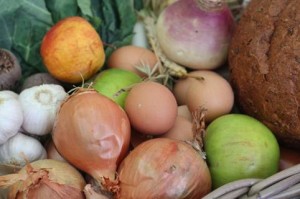2016 - June : Alice Tosos - Islamic diet in Portugal :
insights from stable isotope analysis.
|
The Iberian Peninsula, a crossroad between Africa and Europe, located between the Atlantic and the Mediterranean, saw the birth of one of the first multi-faith and multi-cultural societies in medieval Europe. For seven centuries Jews, Muslims and Christians coexisted in this land shaping a unique pluralistic society, first under Islamic political control, and later under Christian rule following the reconquest of the 12th century. |
|
Diet had an important cultural and symbolic meaning in medieval societies. The way in which a food is chosen, prepared and consumed offers an insight into the more diverse aspects of a society: social and family organization, social status, economic strategies as well as resource management and exploitation. This is especially intriguing for the multifaith societies of Medieval Iberia were Christians, Muslims and Jews coexisted during the medieval period. |
The history of food and diet can be studied from several perspectives and an holistic approach is fundamental in order to contextualize the archaeological data. Although historical sources and contemporary material culture and remains cannot and should not be disregarded, the reconstruction of the diet, thanks to the use of dietary isotopes, is the only method that can provide direct evidence for food consumption at the individual level. This research uses carbon (13C) and nitrogen (15N) stable isotope analysis to investigate the diets of Islamic and Christian communities from three sites in the South of Portugal: Lisbon, Beja and Silves.
She found that by looking at the carbon and nitrogen isotopes contained in the human bones it appeared that Muslims consumed a diet mainly from a terrestrial source eg. mutton,chicken,rabbit whereas Christians also consumed a marine sourced diet - possibly due to the fasting period when no animal meat was eaten. This was evident from the results at both Beja and Silves. The social status of each group was also reflected in the amount and type of grain consumed.
Evidence from Lisbon, in particular, seems to show that in the Islamic tradition higher status males had separate living arrangements and diets from the females (with their children) - this being reflected in the isotope results, whereas those families in the poorer areas lived a more communal life consuming the same kind of food.
Finally Alice has been looking at the diets of children when being breast-fed and after weaning. Babies when breast-fed are in essence consuming the same diet as their mother and results reflected this but on weaning (at approx 24 months) the child was given a diet similar to porridge (pap, millet). This seems to have been common practice, as she compared the Iberian results with those from 3 sites of similar date in the UK.
One important point is that Alice was unable to compare her results from Muslim and Christian remains with those from the Medieval Jewish communities because of religious restrictions within the Jewish faith.
Evidence from Lisbon, in particular, seems to show that in the Islamic tradition higher status males had separate living arrangements and diets from the females (with their children) - this being reflected in the isotope results, whereas those families in the poorer areas lived a more communal life consuming the same kind of food.
Finally Alice has been looking at the diets of children when being breast-fed and after weaning. Babies when breast-fed are in essence consuming the same diet as their mother and results reflected this but on weaning (at approx 24 months) the child was given a diet similar to porridge (pap, millet). This seems to have been common practice, as she compared the Iberian results with those from 3 sites of similar date in the UK.
One important point is that Alice was unable to compare her results from Muslim and Christian remains with those from the Medieval Jewish communities because of religious restrictions within the Jewish faith.
No similar research has been conducted in Portugal so far. This project is therefore addressing a gap in our current understanding of medieval pluralistic societies, providing the first bio-archaeological data on diet and nutrition in medieval Portugal. It is very much a work in progress and Alice hopes to extend her understanding of the subject with future investigation.
Academic profile
Alice undertook a BSc (Hon) in Archaeology at the University of Bologna 2007-2011 and completed an MSc in Paleopathology at the University of Durham in 2013 focusing on the health and overall fitness of two medieval populations from Asti, in the north of Italy. After completing her education she worked as a Research Assistant on a Forensic Anthropology project in Porto, Portugal. She is currently a PhD candidate at the University of York, funded by the White Rose College of Arts and Humanities (WRoCAH). Her project “Diet in Islamic Portugal” is part of the network ‘Faith in Food and Food in Faith’, in collaboration with the Universities of Leeds and Sheffield. Among her research interests are the use of biomolecular techniques to explore diet and nutrition during transitional period in the past societies.
Alice undertook a BSc (Hon) in Archaeology at the University of Bologna 2007-2011 and completed an MSc in Paleopathology at the University of Durham in 2013 focusing on the health and overall fitness of two medieval populations from Asti, in the north of Italy. After completing her education she worked as a Research Assistant on a Forensic Anthropology project in Porto, Portugal. She is currently a PhD candidate at the University of York, funded by the White Rose College of Arts and Humanities (WRoCAH). Her project “Diet in Islamic Portugal” is part of the network ‘Faith in Food and Food in Faith’, in collaboration with the Universities of Leeds and Sheffield. Among her research interests are the use of biomolecular techniques to explore diet and nutrition during transitional period in the past societies.


